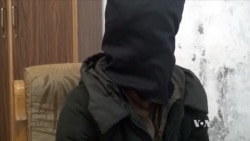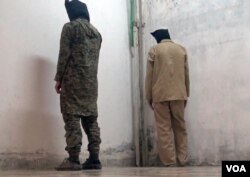The Islamic State fighter spoke softly, his voice unbroken by adolescence. A prisoner of Kurdish YPG (People’s Protection Units) forces, he sent a message to his family asking for forgiveness. "I destroyed myself and I destroyed them along with me."
The Syrian youth is among several IS detainees brought to a prison in al-Malikiyah, northeastern Syria. They were captured in a YPG offensive last month to regain Tal Hamis from IS control.
Both the youth and a Turkish fighter spoke separately to VOA’s Kurdish Service while in custody. Both were hooded but unshackled, the hoods removed when they spoke. Their names have been changed and identifying details obscured.
The Turkish prisoner, Ahmet, told a story familiar to every expert on IS recruiting. A young man adrift - a sometime university student, sometime baker, interested in political Islam, in touch online and by phone with a friend with similar or, as it turned out, more extreme inclinations.
The friend traveled to Syria and told Ahmet he had joined the Islamic State group. Ahmet said he was surprised but intrigued. "I don't find American, British or other news agencies, especially on Middle East Muslims, very trustworthy," he told VOA. "I wanted to see it with my own eyes."
Fighting ‘for God’
Ahmet said he traveled to Syria in part to observe, but also because of his beliefs and what he called "the repression."
"I wanted to get rid of this repression according to God's order," he said. "I came to fight for God. When I kneel down to pray, I think about bombardments that I witnessed, the deaths of children I saw with my own eyes. I came across all of these."
Traveling south to a contact near the Syrian border, Ahmet said he met some Europeans, an American, someone from China and a Russian - from Dagestan, he guessed.
Once in Syria, they were divided into groups. The local leader wanted them to go to the front right away. "We were all very confused because none of us had seen war," he said.
Four months into his new life with IS, Ahmet said he was told to secure a village near Tal Hamis. Then the YPG attacked: "We all started to run."
His companions were killed; he was shot in the leg. "Thirteen, 14 kilometers I crawled with this wounded leg, for three days." He hid in a house until the owner came back and turned him over to the YPG. The Kurds, he said, took him to a hospital, then to jail.
The Syrian prisoner's tale also starts with a conversion - not online, not in the mosques, but through someone he knew.
Hussein left his family without revealing his plan, then threw himself into his new life: physical training, prayer, weapons instruction. There were foreigners there, he said, from Senegal, France, Kazakhstan, Turkey, training in separate groups. The cook, he said, was Chinese.
Once his training was complete, Hussein said he was sent from village to village, at times deployed at checkpoints, other times taking part in battles. He, too, was captured in the Tal Hamis campaign.
Asked about some of the more abhorrent practices of the Islamic State group, Hussein said he never witnessed beheadings, but he did see videos of them shared by cell phone. He said he was unaware of "jihadi marriages" - women recruited for sexual use by the militants. And he knew nothing, he said, about how children were recruited, though he added there was a 13-year-old in his group.
Hussein's own age remained unclear. His YPG guards said he told them he was 19. Later the Kurdish authorities said he was born in 1997. Despite a wisp of a moustache and the beginnings of a beard, his voice and mannerisms made him appear much younger.
Gray zone
What comes next for the prisoners is unclear. They have not been seen by the International Red Cross and Red Crescent, but Kurdish officials say they would welcome any such visit.
Both sides are in a gray zone. Despite declaring themselves Islamic State soldiers, they are non-state combatants. Their captors are non-state actors as well. The de facto Kurdish government of the self-declared Rojava region is, from a legal point of view, part of Syria. Kurdish authorities told VOA some detainees have been freed.
Hussein has no thoughts of release. "I expect I will stay in prison, for sure," he said.
While the Syrian youth expressed remorse, his Turkish comrade offered no such misgivings. "I am a student," Ahmet said, shortly before guards put the hood back over his head and led him away.
Hussein put the hood back on himself.






